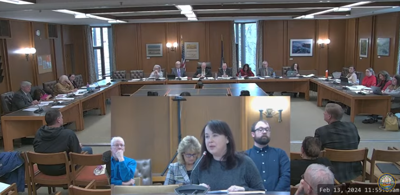CONCORD — Wendy Fisher of Nashua said she was shocked to learn that when her 10-year-old, emotionally troubled son tried to take his life in a seclusion room at Broad Street Elementary School in Nashua in March 2023, there was no audio or video footage of the incident.
“There is nothing better than playback video. Footage doesn’t lie. Take the footage to protect the teacher, child and everyone else,” Fisher told the House Children and Family Law Committee Tuesday.
Fisher and other mothers and fathers spoke for legislation to permit the parent of a special needs student to request that the child’s Individualized Education Plan require that audio and video be taken of any seclusion or restraint event in public schools.
The bill would also direct schools to notify those parents “as soon as practicable” once their child was restrained or isolated.
According to the state Department of Education, there were 1,434 instances of seclusion and restraint during the 2021-22 year, the most recent report on file.
Schools in Dover led the list, with the Broad Street school in Nashua having the second-most with 169 incidents.
Maureen Tracey, an educational consultant and parent of an adult with disabilities, said 80% of those placed in restraints and secluded are special needs students with an IEP.
Since the COVID-19 pandemic ended, Tracey believes there have been more incidents of seclusion and restraint.
“Kids come home bruised, they come home with rug burns, concussions, notes say they spent two hours in a seclusion room and nobody knows what happens,” Tracey said.
‘Fight or flight’
“Is there an implication that education professionals are abusing children? That’s the crux of it,” said state Rep. Peter Petrigno, D-Milford, a retired teacher and member of the House panel that took testimony on the bill.
Tracey responded, “I would say staff go into their own fight or flight mode.”
Rep. Tim McGough, R-Merrimack, said he filed the bill (HB 1269) to build on laws the Legislature passed that ban the use of “prone restraint” in schools and beef up mandatory reporting that all schools have to make to the state about every incident that takes place.
“The issue still persists, and it happens just too often in New Hampshire schools,” McGough said.
Manchester’s Ryan Day said his 7-year-old son with autism spectrum disorder had no behavioral problems.
Yet after attending a self-contained classroom in Manchester, his son came home with numerous injuries, his father said.
“He had face injuries including bruises on his face, swelling, a cut lip, broken tooth, a swollen jaw that lasted a few weeks,” Day recalled. “We were told there were trips and falls; we didn’t believe it.”
The child also began wetting his pants at school, not at home, he added.
“We were just told he was just regressing,” Day said.
The parents moved the child back to a neighborhood school for second grade where he got one-on-one instruction and thrived, Day said.
Two behavioral technicians with Applied ABC, a private contractor, have recently been charged with assaulting elementary school children.
Day said one of those technicians had worked with his son.
“Children without a voice need to be protected and there needs to be safety and accountability for what happens in school,” Day said.
Sponsor: Cameras lead to fewer incidents
McGough said Nashua officials have installed video and audio equipment at the Broad Street Elementary School that houses Project Achievement, a program that takes the most challenging cases of special needs students from across the city.
“Since the cameras have been installed, the incidents there have gone down significantly,” McGough said.
But Karen Rosenberg, policy director with the Disabilities Rights Center, opposed the measure.
She warned it could lead to greater use of restraints and seclusions and not give parents the relief they are seeking.
Parents can already ask for such footage to be taken, but it’s up to the IEP group to make that decision and a parent is typically one member of the five-person team, she noted.
“We have a problem where students are being restrained and secluded at unconscionable rates, but I don’t think this bill adequately addresses it,” Rosenberg said.
Reforms that would help, she said, would mandate that public school seclusion rooms have video and audio equipment and direct the state Department of Education to do more oversight other than produce an annual report on the gross number of incidents without any analysis.
Some parents opposed the bill online and said they have successfully prevented their child from being restrained or secluded in school.
“It does not protect any child,” wrote Jennifer Belmont-Earl of Barrington, the mother of two autistic children.
“In fact, it lends legitimacy to a practice that has been stopped in several states across the political spectrum: seclusion and restraint.”
Fisher said she hopes the bill will lead to greater training of paraprofessionals who work with special needs students in schools and help them resolve behaviors without the need for physical intervention.
“When a child is placed in seclusion in a special ed classroom and regulated to this smaller room, the dignity of that child is already gone,” Fisher added.
Committee Chairman Mark Pearson, R-Hampstead, said he’ll ask the committee to make a recommendation on this bill when it meets March 5.












